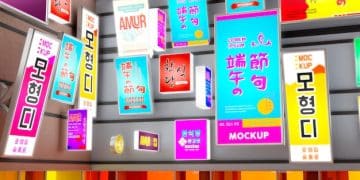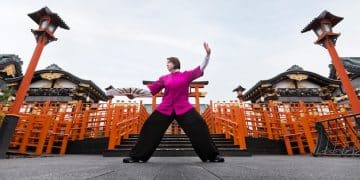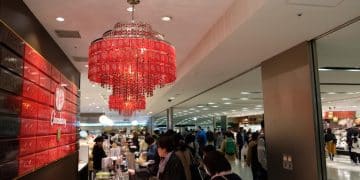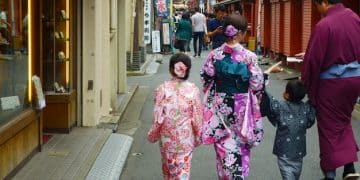Best Time to Shop in Japan: 2025 Sales Guide for US Travelers
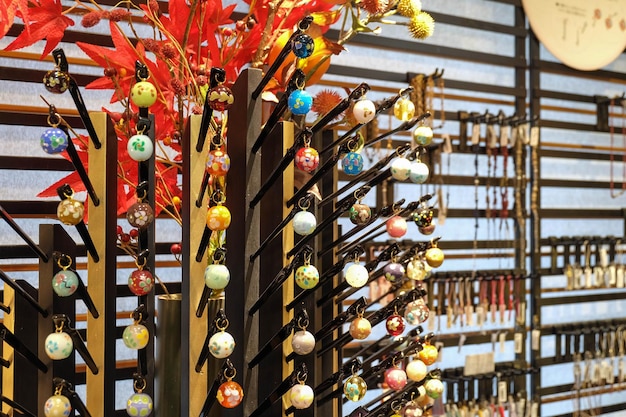
The best time to shop in Japan in 2025 for US travelers is during the seasonal sales periods, including New Year’s sales (January), summer sales (July/August), and winter sales (December), offering significant discounts and unique promotions on a wide range of goods.
Planning a trip to Japan in 2025 and hoping to snag some amazing deals? This comprehensive guide will reveal the best time to shop in Japan: A US Traveler’s Guide to Seasonal Sales and Promotions in 2025, ensuring you make the most of your shopping spree.
Understanding Japan’s Shopping Seasons
Japan offers a unique shopping experience, but knowing when to go can dramatically impact your savings. Understanding the seasonal sales and promotional periods is key to maximizing your budget and finding the best deals. These sales often coincide with major holidays and cultural events.
Major Sales Periods
Throughout the year, Japan hosts several major sales periods that attract both locals and tourists. These sales offer discounts on everything from clothing and electronics to souvenirs and traditional crafts. Timing your visit to coincide with these periods can lead to significant savings.
Keep an eye out for these key shopping seasons to make the most of your trip.
- New Year’s Sales (Shogatsu): Starting January 1st, these sales feature “fukubukuro” (lucky bags) filled with mystery items at discounted prices.
- Spring Sales: Occurring around March and April, these sales often coincide with the cherry blossom season and offer discounts on spring apparel and goods.
- Summer Sales (Summer Bargain): Taking place in July and August, these sales provide substantial discounts on summer clothing, electronics, and household items.
- Winter Sales: Starting in December and extending into January, these sales offer discounts on winter apparel, electronics, and holiday gifts.
Navigating these sales periods can enhance your shopping experience and lead to incredible finds.
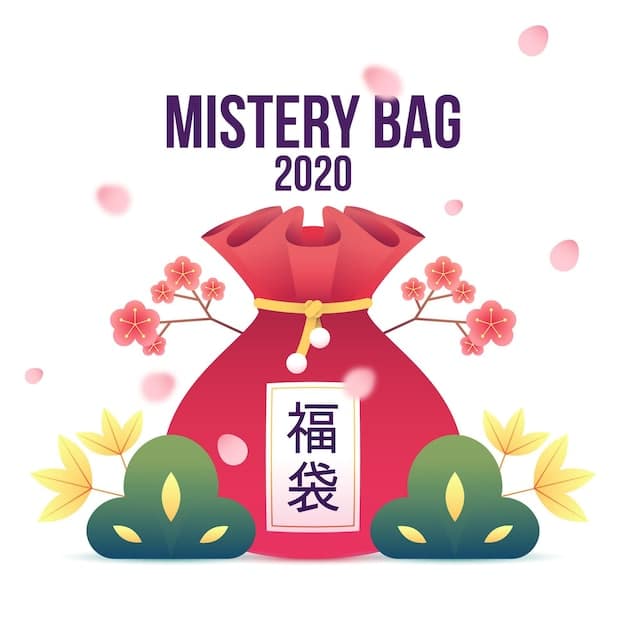
By understanding these seasonal sales, US travelers can strategically plan their shopping trips to Japan in 2025.
Navigating New Year’s Sales (January)
The New Year’s sales, or “Shogatsu,” are a highlight of the Japanese shopping calendar. This period offers unique opportunities, particularly through the tradition of “fukubukuro” or lucky bags. These bags are sold at a set price but contain items of much higher value, making them a popular choice among shoppers.
The Appeal of Fukubukuro
Fukubukuro are mystery bags filled with a variety of items, often from a specific brand or store. The value of the items inside significantly exceeds the price of the bag, offering substantial savings. The excitement of not knowing what you’ll get adds an element of fun to the shopping experience.
These lucky bags are a cultural tradition and an excellent way to score great deals.
Tips for Shopping Fukubukuro
To make the most of your fukubukuro shopping, consider these tips:
- Research Brands: Choose brands and stores that align with your interests to increase the likelihood of getting items you’ll love.
- Arrive Early: Popular stores often have long lines for fukubukuro, so arrive early to secure your bags.
- Check Contents (If Possible): Some stores may provide hints about the contents of the bags, helping you make an informed decision.
Remember that purchasing a fukubukuro can be hit or miss, but the potential for significant savings makes it worthwhile.
Exploring the New Year’s sales and trying your luck with fukubukuro can kickstart your shopping adventure in Japan.

Decoding Summer Sales (July/August)
The summer sales in Japan, usually held in July and August, offer significant discounts on a wide range of products. This is an ideal time for US travelers to shop for summer apparel, electronics, and household goods at reduced prices. Many stores offer promotions and special deals during this period, too.
What to Expect
During the summer sales, expect to find discounts ranging from 30% to 70% off regular prices. Department stores, boutiques, and electronics retailers all participate, making it easy to find deals on a variety of items. Additionally, many stores offer tax-free shopping for tourists, providing even greater savings.
- Clothing: Summer apparel, including lightweight fabrics and seasonal styles, is heavily discounted during this period.
- Electronics: Retailers offer deals on electronics, gadgets, and home appliances, making it a great time to upgrade your devices.
- Household Goods: From kitchenware to home décor, many household items are available at discounted prices during the summer sales.
Take advantage of the warm weather and longer opening hours to browse through the various sales events.
Making the Most of Winter Sales (December)
As the year winds down, the winter sales in Japan offer yet another chance to score great deals. Starting in December and continuing into January, these sales are perfect for holiday shopping and picking up winter essentials at discounted prices. This period is similar to Black Friday in the US, but with a unique Japanese flair.
Holiday Gift Shopping
The winter sales are an excellent opportunity to find unique and thoughtful holiday gifts for friends and family. Many stores offer special gift sets and promotions during this time, making it easy to find something for everyone on your list. Look for traditional Japanese crafts, artisanal goods, and local delicacies to give as souvenirs.
Consider these ideas for holiday gifts:
- Traditional Crafts: Japanese ceramics, lacquerware, and textiles make wonderful gifts that showcase the country’s rich cultural heritage.
- Local Delicacies: Japanese sweets, teas, and snacks are delicious and unique gifts that provide a taste of Japan.
- Gift Sets: Many stores offer beautifully packaged gift sets containing a variety of items, such as skincare products, gourmet foods, or traditional crafts.
Remember to check the store’s return policy if needed.
Insider Tips for Savvy Shopping in Japan
Shopping in Japan can be an exciting but sometimes overwhelming experience, especially for US travelers. To navigate the shopping scene like a pro, keep these insider tips in mind. From understanding tax-free shopping to mastering the art of bargaining, these strategies will help you make the most of your shopping spree.
Tax-Free Shopping for Tourists
One of the best perks for tourists shopping in Japan is the tax-free system. Foreign visitors can avoid paying consumption tax (currently 10%) on purchases made at participating stores. To qualify for tax-free shopping, you typically need to spend a certain amount (usually around ¥5,000) at a single store on the same day. Be sure to bring your passport, as it’s required to process the tax refund.
Here’s how to take advantage of tax-free shopping:
- Look for Tax-Free Signs: Participating stores will display a “Tax-Free Shopping” sign, often in multiple languages.
- Minimum Purchase: Ensure your total purchase meets the minimum spending requirement (usually ¥5,000) at a single store.
- Passport Required: Present your passport at the checkout counter to receive the tax refund.
Saving on consumption tax can add up quickly, especially if you’re making larger purchases.
Understanding Payment Methods
While credit cards are widely accepted in larger cities and department stores, smaller shops and rural areas may prefer cash. It’s always a good idea to carry some Japanese Yen (JPY) with you to avoid any payment issues.
Keep these things in mind regarding payment options:
- Cash is King: Many smaller establishments still prefer cash payments, so have some JPY on hand.
- Credit Cards: Major credit cards like Visa and Mastercard are generally accepted in larger stores and cities.
- Contactless Payments: Contactless payment methods like Apple Pay and Suica are becoming increasingly popular but may not be universally accepted.
Being prepared with different payment options ensures a smooth shopping experience.
Language Barriers and Communication
Although many Japanese people understand basic English, it’s helpful to learn a few basic Japanese phrases to facilitate communication. Knowing how to ask for prices, sizes, and assistance can greatly enhance your shopping experience.
Here are some useful phrases to learn:
- “Ikura desu ka?” (How much is it?)
- “Kore wa nan desu ka?” (What is this?)
- “Sumimasen” (Excuse me)
Planning Your Shopping Trip in 2025
As you plan your shopping trip to Japan in 2025, consider these practical tips. From researching store hours and locations to preparing for crowds, these strategies will help you make the most of your shopping experience. By planning ahead, you can avoid common pitfalls and ensure a smooth and enjoyable trip.
Research Store Hours and Locations
Before heading out on your shopping spree, take some time to research the store hours and locations of the places you plan to visit. Many department stores and shopping centers have websites with detailed information about their operating hours, addresses, and transportation options.
Consider these valuable things when researching:
- Check Websites: Visit the official websites of department stores and shopping centers for the most up-to-date information.
- Use Maps: Utilize online maps to locate stores and plan your route in advance.
- Note Holidays: Be aware of any public holidays in Japan, as some stores may have reduced hours or be closed on these days.
Remember to consider traveling time in your schedule.
By following these strategies, US travelers can approach their shopping endeavors in Japan with confidence, fully prepared to seize the opportunities presented by the seasonal sales and promotions of 2025.
| Key Point | Brief Description |
|---|---|
| 🎉 New Year’s Sales | Lucky bags (fukubukuro) offer mystery items at great discounts. |
| ☀️ Summer Sales | Discounts on summer apparel, electronics, and household goods. |
| ❄️ Winter Sales | Great deals on winter apparel and holiday gifts, similar to Black Friday. |
| 🛂 Tax-Free Shopping | Tourists can avoid consumption tax (10%) on purchases over ¥5,000 with a passport. |
Frequently Asked Questions
▼
The New Year’s sales typically start on January 1st and can last for several weeks, offering great deals on various items, including lucky bags (fukubukuro).
▼
Fukubukuro are mystery bags sold during New Year’s sales, containing items of higher value than the bag’s price. The contents are unknown until opened, adding excitement.
▼
Summer sales in Japan typically take place in July and August, offering discounts on summer apparel, electronics, and household goods in many stores.
▼
Tourists can avoid paying consumption tax (10%) on purchases over ¥5,000 at participating stores by presenting their passport at the time of purchase.
▼
Credit cards are widely accepted in larger cities and department stores, but it’s wise to carry some Yen for smaller shops and rural areas that may prefer cash.
Conclusion
Understanding the best time to shop in Japan: A US Traveler’s Guide to Seasonal Sales and Promotions in 2025 can greatly enhance your shopping experience and savings. By timing your visit to coincide with New Year’s, summer, or winter sales, and by taking advantage of tax-free shopping, you can make the most of your trip and bring home amazing finds. Remember to plan ahead, research store hours, and prepare for possible language barriers to ensure a smooth and fulfilling shopping adventure.
